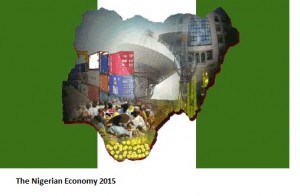 In the out-gone week, The Federal Minister of Finance and Coordinating Minister of the Economy, Dr.Ngozi Okonjo-Iweala, proposed a 2015 spending plan of N4.36 trillion to the
In the out-gone week, The Federal Minister of Finance and Coordinating Minister of the Economy, Dr.Ngozi Okonjo-Iweala, proposed a 2015 spending plan of N4.36 trillion to the
National Assembly. The appropriation bill has N2.6 trillion earmarked for recurrent expenditure, N634 billion for capital projects and N943 billion for debt servicing. Expected revenue of N3.6 trillion is partly based on expected crude oil production of 2.27 million barrels a day and a benchmark oil price of USD 65 a barrel.

According to the Minister, there sulting budget deficit is projected to be 0.79% of gross domestic product, lower from 1% for 2014. As a means of shoring up 2015 revenue, the Federal Government will be implementing austerity measures partly targeted at luxury goods which include 10% import surcharge on new private jets, 39% import surcharge on luxury yachts, and 5% import surcharge on luxury cars, amongst other things.
Meanwhile, international crude oil prices continued to slide amid relatively high supply. OPEC’s reference basket price of crude oil dropped by 9.31% to USD 55.84 a barrel while ICEB rent crude oil price plunged by 5.74% to USD 60.64 a barrel a sat Wednesday.

Consequently, Nigeria’s public sector foreign assets declined by 1.71% to USD 35.27 billion. In another development, National Bureau of Statistics (NBS) reported lower increase in general price level of goods and services to 7.90% in November (as against 8.10% in October). The lower rise in head line inflation was a saresul to fast lower rise in food prices–food inflation rose to 9.10%(y-o-y) in November, lower than 9.30% recorded in October – due to increased food supply in the ongoing harvest season.

On a twelve months moving average, the rise in food prices remained flat at 9.50% for the sixth consecutive month, although there was month-on-month increase to 0.60% (from 0.50%in October).
On the other hand, core inflation increased at the same pace of 6.3% for the fourth consecutive month in November. Imported food index increased y-o-y by 8.09% (faster than 7.93%) in November amid depreciation of the local currency as well as a 0.4% increase in price of global agricultural commodities especially vegetable oils/meal, cereals and seafood prices. Also in the week, NBS reported a decline in external sector activities in the third quarter of 2014.
In the review period, total value of merchandise trade declined quarter-on-quarter by 5.4% (and y-o-y by 21.18%) to N6.29 trillion. The decrease was a result of both a fall in the value of exports and imports. Q3 2014 exports decreased q-o-q by 4.30% (and y-o-y by 24.18%) to N4.48 trillion while imports fell q-o-q by 12.69% (and y-o-y by 7.90%) to N1.82 trillion. Crude oil exports constituted 65.40% or N2.9 trillion of total exports (lower than 69.8% in Q2 2014) while non-crude oil export accounted for the remaining 34.60% or N1,548.5 billion (higher than 30.2% in Q2 2014). Third quarter imports classified by Broad
Economic Category showed that Industrial Supplies accounted for 28.0% or N510.2 billion of total imports; followed by Capital goods (20.80% or N378.9 billion); and Food and beverages (17.80% or N323.8 billion).
On a positive note, trade balance remained favourable at N2.66 trillion. More so, in the nine months to September 2014, total merchandise trade increased y-o-y by 14.76% to N18.47 trillion as exports increased by 21.94% to N13.13 trillion while import supped by 0.25% to N5.34 trillion.
New CBN Policy Reduces Activities at the Inter bank Market…
At the official window, the Central Bank of Nigeria Offered USD350 million but sold USD399.90million (N67.18billion), a 14.34% increase from the USD 349.75 sold last week, at the twice weekly Retail Dutch Auction (RDAS). At the inter bank market, there was a lull in trading activity due to recent CBN directives. With the aim of curbing the current USD / Naira volatility, the apex bank mandated that the Foreign Exchange Trading Position of individual authorized dealer, which is currently 1% of shareholders funds (unimpaired by losses), with immediate effect, be reviewed down to zero percent temporarily. This caused temporary halt in trading activities on Thursday which lasted until Friday.
The CBN also reiterated in another circular, that funds purchased from banks at the inter bank foreign exchange market be utilised within 48 hours from the date of purchase. The value of the naira relative to the dollar depreciated by 1.35% week-on-week to N184.45/USD from N182/USD while there were no confirmed sales by oil majors. The local currency also depreciated at the Bureau de Change by 0.27% to N188.50/USD while it fell at the parallel market to N189.50/USD from the previous weeks N189/USD.
This week we expect increased pressure at the parrallel market as the Central Bank closes for the year.
NIBOR Recedes On FAAC inflows, Treasury bill maturities…
On Wednesday, 17 December treasury bills worth N190.92 billion were auctioned via the
primary market (91-day bill worth N33.27 billion; 182-day bills worth N50.03billion; and
364-day bills worth N107.62billion). Treasury bills of equivalent amounts and maturities were redeemed the day after. Also, Federal Accounts Allocation Committee funds worth N628.77 billion propped up liquidity in the financial system.
Hence, Nigerian Inter bank Offered Rates for the overnight, 1month, 3months and 6month tenors, declined, respectively to 15.17% (from 25.67%) 15.90% (from 17.10%), 16.41% (from 17.28%), and 17.37% ( from 17.04%). Also, overnight fund shit an all time high of 65.97% on Wednesday as liquidity shortages pushed up rates. This week, the apex bank will auction treasury bills worth N53.38 billion via the primary market (91-day bill worth N21.54 billion; 182-day bills worth N31.84 billion) while, an equivalent amount of treasury bills will mature through the same mechanism. In addition, 136-day bill worth N221.47 will mature via open market operations. This week we expect the impact of FAAC inflows to linger in addition to anticipated liquidity boost from treasury bill maturities.
FGN Bond Prices Moderate on Sustained Sell Pressure…
In line with our expectations, the local OTC bond market saw further weekly decline in FGN bond prices amid sustained sell pressure. The 20-year, 10.00% FGN JUL 2030 bond lost N3.40 (yield increased to 14.01% from 13.33%).
Also, the 10-year, 16.39% FGN JAN 2022 paper shed N4.55 (yield rose to 15.25% from 14.25%); the 7-year, 16.00% FGN JUN 2019 instrument declined by N3.50 (yield advanced to 15.43% from14.37%); the 5-year 15.10% FGN APR 2017 bond tumbled by N1.70 (yield rose to 15.33% from 14.46%); while the 3-year, 13.05% FGNAUG 2016 debt weakened by N1.05 (yield increased to 15.41% from 14.64%). The domestic market, the Debt Management Office (DMO) auctioned N65 billion in three local currency debt issues on Wednesday, December 17, 2014 (all reopenings); viz: N10 billionin the 3year, 13.05% FGNAUG 2016 note; N30 billion in the10-year, 14.20% FGNMAR 2024 paper; and N25 billion in the 20year, 12.1493% FGNJUL 2034 bond.
As expected, the marginal rates of the respective maturities increased to 15.49% (from 12.00%), 15.20% (from 12.80%) and 15.49% (from 13.00%). This week, we anticipate sustained sell pressure on sustained lull in international crude oil prices.
Equities Market Closes Weak…
In the just concluded week, the bearish trend was mitigated by two days of consecutive gains on the back of bargain hunting activities by investors. How beit, on a weekly basis, the twin market performance measures, the NSE ASI and market capitalisation, each declined by 172 bps to close at 30,234.64 points and N9.98 trillion respectively. Also, total deals, transacted volumes and Naira votes advanced by 7.68%, 192.24% and 60.28% to 22,262 deals, 5.28 billion shares and N46.34 billion respectively. The sectored guages closed mixed the NSE Banking Index plunged by 3.49% to 312.66 points while the NSE Oil/Gas Index decreased by 3.17% to 366.79 points. On the gainers side, the NSEA SeM Index, rosee by 6.72% to close at 1121.05% on the back of share so frequently listed mortgage bank, Omoluabi Savings and Loans. Meanwhile, the NSE announced that as part of its yearly review of the Index, Mobil Nigeria, 7UP Bottling Company, Unity Bank, Seplat Petroleum and Sterling Bank will be included in the NSE 30 Index while Total Nigeria, Glaxosmith kline, Fidelty Bank, Ashaka Cement and FCMB will be removed.
This week, we anticipate a dominance of the bears on heightened economics care and festive fever.
 MMS PLUS NG – Maritime, Aviation, Business, Oil and Gas News Online Newspaper with coverage in Maritime, Oil and Gas, Aviation, Power and Energy as well as Financial News
MMS PLUS NG – Maritime, Aviation, Business, Oil and Gas News Online Newspaper with coverage in Maritime, Oil and Gas, Aviation, Power and Energy as well as Financial News









